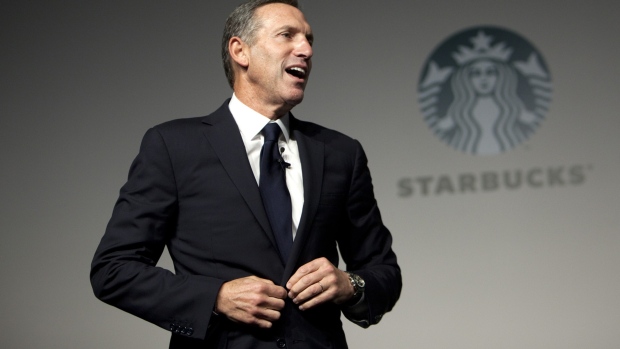Jun 5, 2018
Starbucks’ Schultz hints political career may be brewing
, Bloomberg News

Starbucks Corp. Chairman Howard Schultz will leave the coffee chain later this month, fueling speculation that the billionaire may be mulling a presidential run in the age of celebrity leaders.
In the memo Monday announcing his exit, Schultz said that he is “thinking about a range of options for myself, from philanthropy to public service, but I’m a long way from knowing what the future holds.”
Schultz, 64, aimed for a big splash with his departure announcement. He gave an extended interview to the New York Times in advance and has another with CNBC scheduled for Tuesday morning.
He told the Times he has become “deeply concerned about our country -- the growing division at home and our standing in the world.” He didn’t commit one way or the other to a U.S. presidential run, though he could lean on the experience of longtime board member Bill Bradley, the ex-senator and former presidential candidate.
POLITICAL LEANINGS
The Times reported in March 2017 that Schultz “came close” to getting into the 2016 presidential race but backed off after concluding that Hillary Clinton would win the nomination -- and likely the White House. He eventually made a high-profile endorsement of Clinton in New York in the lead-up to the 2016 election, taking thinly veiled jabs at Donald Trump while not mentioning him by name.
“I hope after the election -- and hopefully Hillary Clinton will be elected president -- we’ll begin to see a level of community and people coming together,” Schultz said in 2016.
Schultz, who helped Starbucks grow from 11 stores to more than 28,000 in 77 countries, will become chairman emeritus on June 26. His exit brings to a close a nearly four-decade run at the company that ushered coffeehouse culture into mainstream American life and carved out a global restaurant empire to rival McDonald’s. Veteran retailing executive Myron Ullman will take over as the new head of the board, the company said in a statement.
Starbucks is still growing in the U.S. -- but not at the spectacular rates of the past. The company is betting big on China, where it plans to more than triple revenue in the next five years. But investors have been underwhelmed by the company’s outlook, with the shares falling about 11 per cent in the past year. They slipped as much as 1.7 per cent in early trading Tuesday.
Schultz has grown increasingly political in recent years, showing a willingness to wade into thorny social issues and lamenting the divisiveness in the U.S. even as he was leading a restaurant company with 14,000 locations all across the U.S. Even though it was largely mocked on social media, he enlisted baristas to write “Race Together” on cups to spur a national conversation on race.
He’s also spoken frequently about being a “servant leader” since he returned to the helm of Starbucks in 2008 after a hiatus. He gave a statement in 2015 saying that the next president should be able to work with both parties in Congress.
“Everyone seeking the presidency professes great love for our nation,” he said. “But I ask myself, how can you be a genuine public servant if you belittle your fellow citizens and freeze out people who hold differing views?”
ANTI-BIAS TRAINING
The coffee chain recently faced a backlash after two black men were arrested at one of its Philadelphia cafes while waiting for a meeting to start. The chain closed about 8,000 company-owned stores for an afternoon of anti-bias training last week, a decision that some shareholders questioned due to the expense. Schultz likened the cost of the training to providing health care or tuition help for employees.
Schultz, whose net worth is estimated at US$3.2 billion, has had less day-to-day involvement since he stepped down as CEO, and near-term, the company’s strategy is unlikely to change, said Brian Yarbrough, an analyst at Edward Jones. Still, the stock may be more volatile, especially around earnings reports, as investors worry the company will struggle without its visionary founder, he said.
“There comes a time when you have to have faith in your current management team going forward,” Yarbrough said. “The management team is very capable; I don’t have a lot of concerns.”
Last April, Schultz transitioned from chief executive officer to executive chairman, where he oversaw the company’s social impact initiatives. He also was working on growing the chain’s premium Reserve brand that includes flagship roastery locations, as well as a partnership with Italian bakery Princi. His top lieutenant Kevin Johnson took over the CEO role last year.
Schultz will be spending more time with his family this summer, as well as working on a book about the chain’s social impact, the company said.










